Emancipation: April by Mackey Chandler
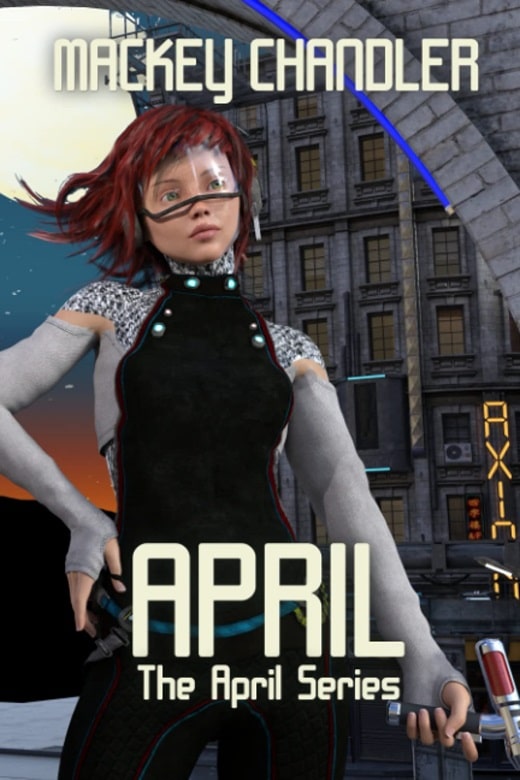 |
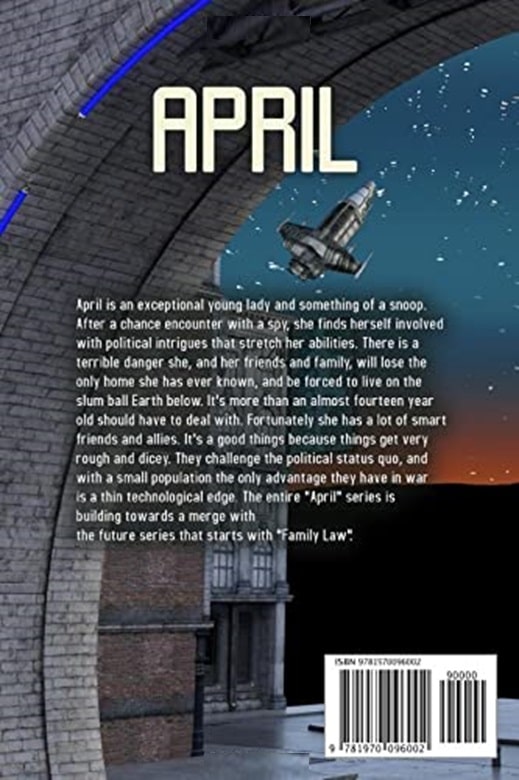 |
April, Mackey Chandler (self published, May 4, 2019). Cover uncredited
Back in 2020, one of the blogs I follow had a paragraph about a newly released self-published novel, Who Can Own the Stars? by Mackey Chandler. The title sounded interesting, so I tracked it down on Amazon. It turned out to be volume 12 of a series; having enjoyed it, I went back to the first volume, April, and then read through the entire series, one volume at a time.
Like many science fiction writers of an earlier era, Chandler has a background that’s technological rather than literary. The April series is self-published, and has the rough spots that often go with that: It could benefit from a professional line edit, both to catch errors of language and to avoid minor inconsistencies such as changing a character’s name. As a copy editor, I’m sensitive to such things, and often they put me off a book. However, I just finished rereading April, and still found it both enjoyable and interesting.
April is somewhat like a classic science fiction juvenile (not quite the same thing as a young adult novel — readers’ and publishers’ expectations have changed over the decades). Its protagonist, April Lewis, is approaching her fourteenth birthday at the start of the novel; her closest companions, Heather Anderson and Jefferson Singh, are older, but still under 18. A classic problem for this type of story is to give the young characters enough freedom of action for them to have interesting adventures, without straining the reader’s suspension of disbelief. Chandler addresses this in two ways.
First, the story is set on an orbital habitat, Mitsubishi-3, owned and operated by the American subsidiary of a Japanese corporation. Chandler establishes early on that children in outer space communities are expected to be more self-directed than children on Earth, are raised in a more “free range” style, and are in fact more mature than Earth children who are kept under constant adult supervision. As a visitor to the station from France reflects while talking with April,
His hostess had told him last night the children were off working on a spaceship, not partying. He’d thought she was joking. These “children” made him uneasy because they just weren’t very — childish.
This contrast of cultures is only part of the differences between Americans on Earth and people in space. We also see that people in space accept biomedical interventions, including anti-aging treatments, that are regarded in many nations on Earth as dangerous, often resented as special privileges of the wealthy, and sometimes considered ungodly. There is also a conflict of interests, as many inhabitants of Mitsubishi-3 have invested in a project to move a metal-rich asteroid into an adjacent orbit, but the federal government has plans to nationalize the asteroid, hoping to stabilize its own finances. This eventually leads to open conflict and secession.
Second, at a meeting of Mitsubishi-3’s residents to discuss policy toward the United States, April’s right to speak is questioned on the basis of her age, which leads to a decision to have adult status based not on age but on a vote in favor of emancipation — one that April wins by a large margin. This becomes both a further cultural gap and a solution to the narrative problem.
In fact, emancipation seems to be the theme of this story, in two different senses. On one hand, it’s about minors gaining adult rights, or at least protection from adult abuse, a topic that’s addressed earlier in the novel through another girl whom April helps get away from an abusive father. On the other, the larger, political story is about emancipation of one society from another, claiming the “separate and equal station” to which the American Declaration of Independence refers.
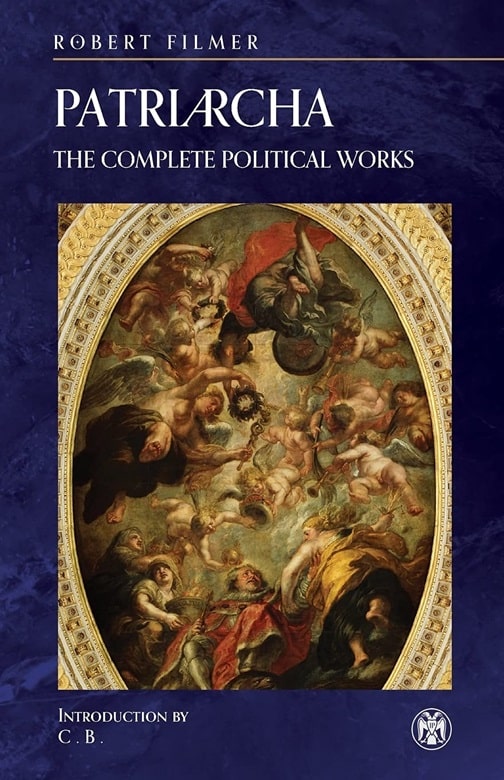 |
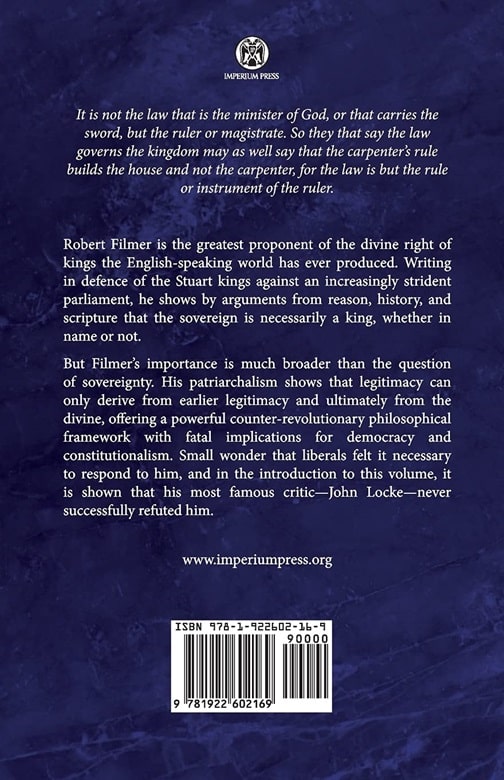 |
Patriarcha by Robert Filmer (Imperium Press, September 29, 2021)
That same abusive father shows up later, having been promised an appointment to govern Mitsubishi-3 on behalf of the federal government, which struck me as a neat way of tying things together. The analogy between the two themes goes back a long way; for example, one of John Locke’s books on political theory was an attack on the claim, in Robert Filmer’s Patriarcha, that the absolute power of kings over their subjects derived from the absolute power of fathers over their families.
Winning a victory against such uneven odds — a community of two thousand against a major national government — takes some explanation! Suspension of disbelief is an issue here too. Chandler’s story provides three different factors favoring the people of Mitsubishi-3 (or Home, as they rename it):
1) The most realistic is what Heinlein used to call the “gravity gauge”: It’s expensive to lift military forces from Earth into orbit, so only a small force can be sent.
2) A more science-fictional factor is the protagonists’ possession of advanced technology, including three key inventions: extraordinarily high-energy-density batteries, able to power portable laser weapons; compact fusion power systems small enough to fit onto a spacecraft; and a radically new technology that allows direct manipulation of gravitational forces at long range. (The fusion power system is what starts off the story, with its being detected from Earth and a government agent sent to investigate and acquire it.)
3) The novel also portrays the American forces, and much of the American government, as arrogant and uninformed. This part falls somewhere between satire and the author’s thumb being on the scales.
The second factor, if granted as a premise of the story, is probably sufficient; the story could have been told without the third. I don’t think the poor decision-making of powerful people is necessarily all that implausible; I certainly can think of some real-world examples. However, the incompetence and arrogance of this novel’s antagonists do tend to make the dénouement seem accidental, rather than being revealed as inevitable, which weakens the structure of the story.
Of the advanced technologies, the second is an invention of Jefferson Singh, one of the central characters, and the third was developed by his newly acquired stepmother, Nam-Kah, a refugee from China to Home (who motivates a subplot about Chinese hostility to the new nation). This takes us to a deeper-level premise than new technology: The existence of extraordinarily capable individuals.
April, Volume 12: Who Can Own the Stars? (August 31, 2020)
Both April and Jeff, in this novel (and Heather, in later novels in the series), are comparable to superheroes: Single individuals who have enough power to take on national governments and win. They’re also superheroic in using their capabilities with at least some restraint: They aren’t out to rule the world or even the United States, and they find noncombatant deaths appalling and try to avoid them. In fact, a secondary theme of April and its sequels seems to be the ethics of war.
Chandler’s protagonists appeal to me, and the storyline has held my attention through more than one reading. At the same time, I can see that realistically, this kind of power imbalance would be appalling in the real world — it’s like the situation described in Belloc’s epigram of 1898 about British colonialism: “Whatever happens, we have got/The Maxim gun, and they have not.”
At the same time, also, the persistent refusal of Earth people, officials, and nations in this book to accept the facts about relative power is a dangerous folly. April and its sequels could be read as a national epic for a hypothetical future outer space society — one in a position like that of Rome or the United States in their respective eras.
Chandler is presenting us with a vision of the future in which the people who venture into space both emerge as humanity’s new great powers, and are more civilized than the societies that came before them; both ideas recapture some of the spirit of classic science fiction, updated to be a plausible future of the early twenty-first century rather than the mid-twentieth.
I just got through spending a week in a cramped ship to rescue the Singhs with this ‘child’ who acted as my copilot and who was the command pilot for hours at a time. She did hazardous rigger’s work out in vacuum. She acted unflinchingly on orders and displayed bravery in combat. She ate the same slop we did, literally scraped the blood of her enemies off without flinching, and went on tired and filthy… If April’s not fit to be here then just tell me and I’ll be happy to leave too because I’m certainly not good enough for you either.
— April, pp. 424–425
William H. Stoddard is a professional copy editor specializing in scholarly and scientific publications. As a secondary career, he has written more than two dozen books for Steve Jackson Games, starting in 2000 with GURPS Steampunk. He lives in Lawrence, Kansas with his wife, their cat (a ginger tabby), and a hundred shelf feet of books, including large amounts of science fiction, fantasy, and graphic novels. His last article for us was a review of Darker than You Think by Jack Williamson.
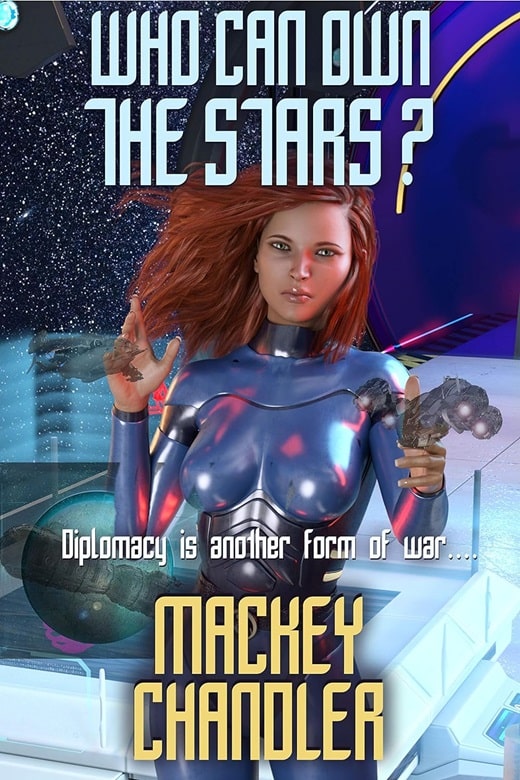
Thank you for writing this deep-treatment analysis and review of the first book and the series. When I spotted the cover, my thought sequence was, “uh oh. Blender figure. Probably early noughties self-pub. Probably great premise with unfortunate execution,” so your article has actively taken it from poke-with-stick status to try-first-volume! status.
Deeply grateful to you for the parsing of themes, narrative conceits, positive-negative balance, and warning of the more distracting elements to brace for. Combing through reader reviews would have barely provided half of this information, but it’s so key for helping a person ease back into a sub-genre that’s been the source of multiple burns.
nicely done